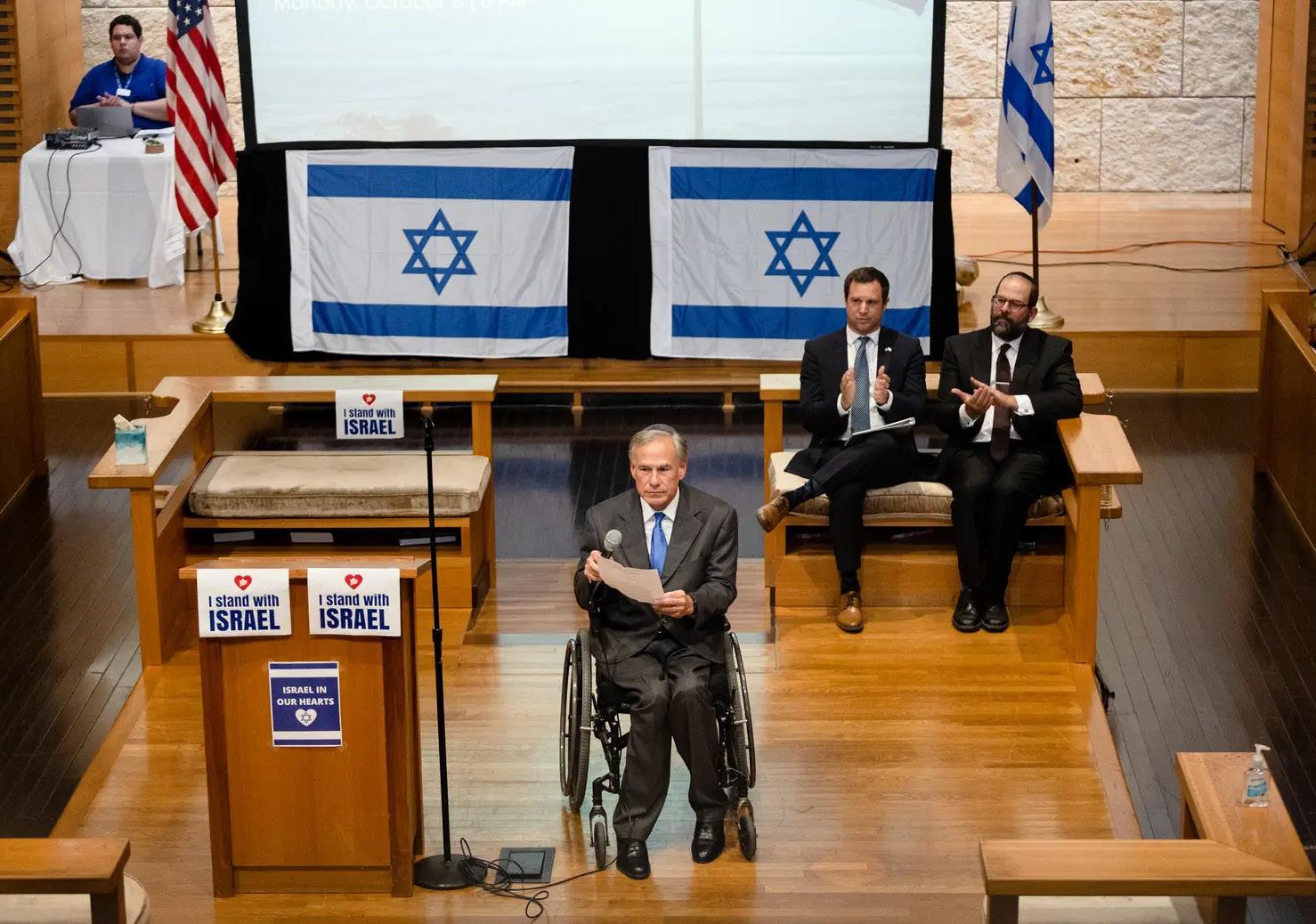
Gov. Greg Abbott attends a community gathering in support of Israel at the Congregation Agudas Achim in Austin on Oct. 9, 2023.
Photo by Evan L'Roy for The Texas Tribune
Governor Abbott requires colleges to revise free speech guidelines
Texas Governor Greg Abbott issued an executive order on Wednesday requiring colleges within the state to revise free speech policies. The order said that it is 'relating to addressing acts of antisemitism in institutions of higher education.'
'Antisemitism is never acceptable in Texas, and we will do everything we can to fight it,' Governor Abbott said. 'The State of Texas stands with Israel and the Jewish community, and we must escalate our efforts to protect against antisemitism at Texas colleges and universities and across our state. Across the country, acts of antisemitism have grown in number, size, and danger to the Jewish community since Hamas' deadly attack on October 7th. Texas took immediate action to protect Jewish schools, synagogues, and other key locations. Many Texas colleges and universities also acted quickly to condemn antisemitism, but some radical organizations on our campuses engaged in acts that have no place in Texas. Now, we must work to ensure that our college campuses are safe spaces for members of the Jewish community.'
The order directs Texas higher education institutions to take three steps as it relates to free speech policies.
• “Review and update free speech policies to address the sharp rise in antisemitic speech and acts on university campuses and establish appropriate punishments, including expulsion from the institution.”
• “Ensure that these policies are being enforced on campuses and that groups such as the Palestine Solidarity Committee and Students for Justice in Palestine are disciplined for violating these policies.”
• “Include the definition of antisemitism, adopted by the State of Texas in Section 448.001 of the Texas Government Code, in university free speech policies to guide university personnel and students on what constitutes antisemitic speech.”
This executive order gives the chair of the Board of Regents 90 days to report back to the Office of the Governor about what actions were taken. For Texas State University, which is under the Texas State University System along with six other universities, Alan L. Tinsley is the Chairman. Both entities issued similar statements.
“Texas State University is reviewing the Governor’s executive order and will take the necessary steps to ensure compliance in a timely manner,” a Texas State University spokesman said.
Texas State University has a page on its website dedicated to the freedom of expression representing the university's current policies, before any changes from the governor's order. It states that “Texas State upholds the First Amendment to the United States’ Constitution.”
“Texas State University is a public institution and supports the free exchange of ideas which includes freedom of speech, freedom of inquiry, and freedom of dissent,” the webpage said. “Texas State respects the right of individuals to express their social and political views through all forms of legally protected speech, press, and assembly.”
Under the Facts and Questions portion of the website, it states “Texas State University has created the Demonstrations on University Property policy which affirms the university's commitment to freedom of speech. It also sets the parameters related to the engagement of free expression and demonstration on university property.
“Additionally, we encourage all who engage in free speech and/or expressive activity on campus to submit Student Involvement's Information Space Request or Special Event Request form. Though not required, it provides an opportunity to engage in dialogue and provide education regarding engaging in activities on campus.”
It also explains what types of expression are not protected by the First Amendment.
“Types of expression that are given less or no protection by the First Amendment (and can then potentially be restricted) include fraud, obscenity, child pornography, speech that incites illegal conduct, true threats, and commercial speech (advertising).
“Individuals or groups may not engage in the following: • Unreasonably infringing on others' rights to free expression
• Threaten or cause injury to others
• Violate the law or University policy
• Enter a restricted area without authorization” The full text can be found at studentinvolvement. txst.edu/freedomofexpression. html











